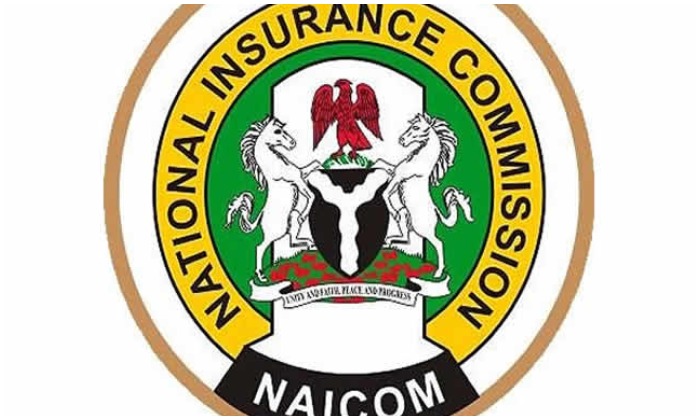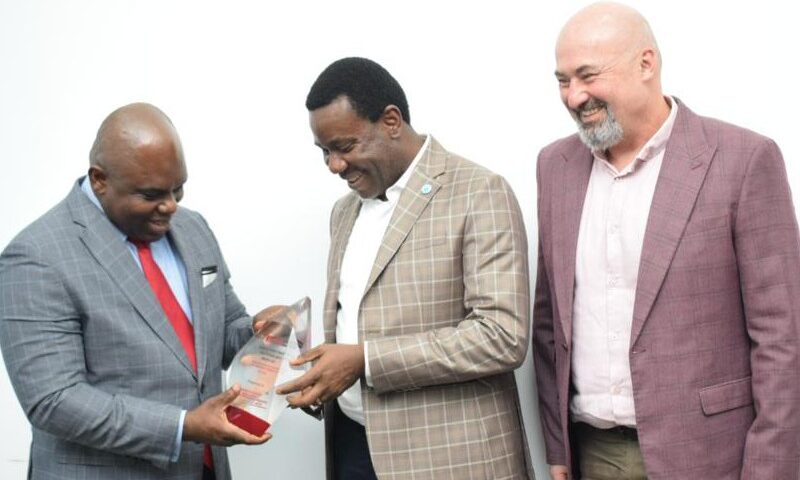All Posts in "Day: November 11, 2022"
Sanlam Life Nigeria wins BAFI Awards 2022 Life Insurance Company of the Year
CAPTION:
L- Dr Ogho Okiti, MD/CEO, Business Day Media; Mr Tunde Mimiko, MD/CEO and Thomas Meisinger, Chief Operating Officer, Sanlam Life Nigeria during the awards presentation at the Sanlam Head Office in Lagos.
By Favour Nnabugwu
Sanlam Life Insurance Nigeria Limited, formerly FBNInsurance, won the Business Day Bank and Other Financial Institutions (BAFI) Life Insurance Company of the Year.
The announcement was made at a high-profile ceremony held recently inLagos.Awarded annually and backed by the highly rated Business Day’s Research and Intelligence Unit, the BAFI Awards seeks to identify and celebrate financial institutions snd their leadership that have excelled across a number of areas.
These include financial performance, shareholder value creation, brand value accretion, corporate governance, sustainability, employment of new technologies, compliance to standards,innovations, and contribution to the industry’s overall growth.
During the award presentation at Sanlam Life’s Head Office in Marina, Lagos, the Managing Director/Chief Executive Officer, Business Day Media, Dr Ogho Okiti,congratulated the management of the Life Insurer on the win while also acknowledging the massive impact Sanlam has made on the continent and in the country.
While accepting the award on behalf of the company, the Managing Director/Chief Executive Officer, Sanlam Life Insurance, Mr Tunde Mimiko, thanked the organizers forthe recognition. “At Sanlam Nigeria, we remain committed to providing exceptional service and adding value to our customers. Our mandate is to continue to deliver efficient and customer friendly insurance services that help our teeming policyholders live with confidence,” he said.
Speaking further, Mimiko said “we are delighted to be honoured with this award, it further confirms our growing leadership status in the industry. We are not slowing down now, indeed, we will take this as another impetus to continuously add superior value and ensure the very best of our policyholders
.”Sanlam is a pan-African brand with a rich history and heritage. Founded in 1918 as a life insurance company, Sanlam has grown to become the largest non-banking financial services group in Africa.
With a strong presence in 33 countries on the African continent, and a niche presence in India, Malaysia, the United Kingdom and Australia, Sanlam is in 8 out of the 10 largest economies in Africa, with a market capitalization of over $8bn, operating profit of $1b before tax and over 154,000 employees globally,delivering superior value to customers, shareholders and the broader society.
Katsina, Kano embrace Takaful insurance, Edo enforces third party
CAPTION:
His Excellencies: Abdullahi Umar Ganduje, Kano State Governor; Godwin Nogheghase Obaseki, Edo State Governor and Aminu Bello Masar, Katsina State Governor
By Favour Nnabugwu
Two States have embraced insurance as part of the state budget for 2023 even as one other state enforced third party insurance in major routes of the state following National Insurance Commission, Naicom market development visits to states
The two state included insurance in their 2023 budget are Katsina and Kano whilst Edo State follow through with third party insurance
Deputy Director, Communication and Market Development, Mr AbdulRasaaq Salami made the disclosure at the recent seminar the Commission organised for insurance Correspondents in Lagos.
“Katsina and Kano have included insurance in their 2923 state budget. Edo State has began the third insurance in major routes of the state since November 1, 2022”
So, we want to spread insurance education all over the country. We visited Katsina twice. On our first visit, the Governor was sincere that he was hearing insurance takaful for the very first time.
On our second visit, we had a fuller engagement involving the grand khadi, emirs and all the rest of the influencers and we taught the gathering about takaful. They researched about it and showed them where the takaful was talked about in Quran.
According to him, “Insurance education remains a very critical issue, especially now that a lot of states, especially in the north, were outside the insurance net”
“We will visit all the states of the country because the insurance business is an integral part of the economy,” he noted.
During Naicom’s visit to Katsina, the Governor of Katsina State Aminu Bello Masari and his Deputy Mannir Yakubu inaugurated Technical Committee on the Sensitisation/Implementation of Compulsory Insurances and Takaful in the state.
The Governor, Aminu Masari while inaugurating the Technical Committee noted that the initiative to introduce Takaful insurance is a welcome development and will serve as an alternative especially to attract people of the state who are left out due to religious or cultural barriers.
He assured the insurance regulator of the Katsina State Government’s full support in the development of insurance in the State.



